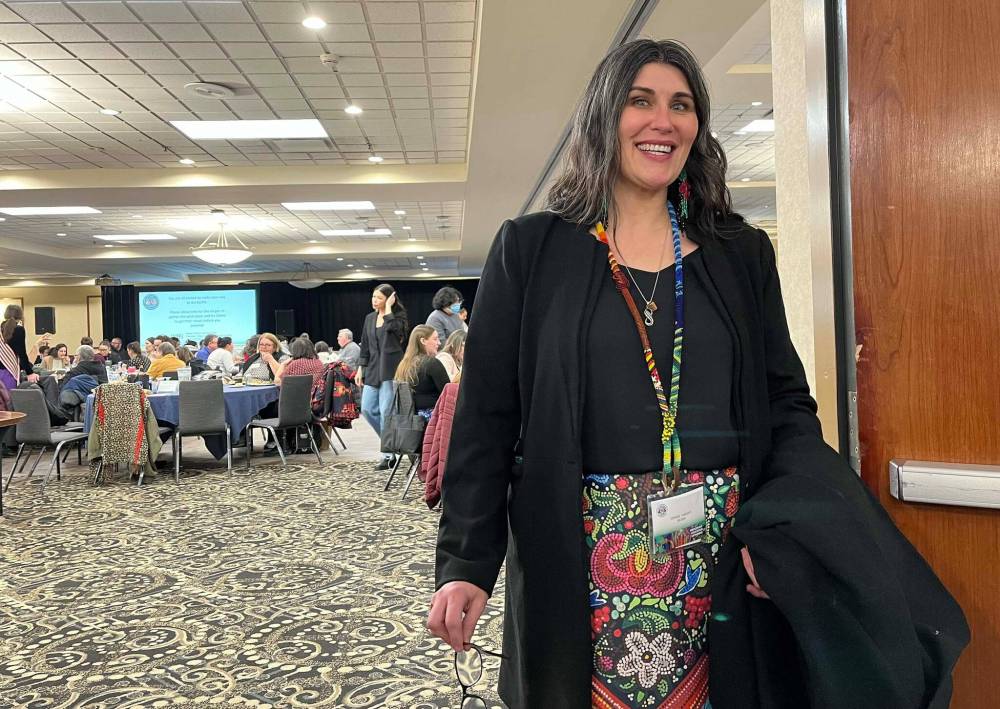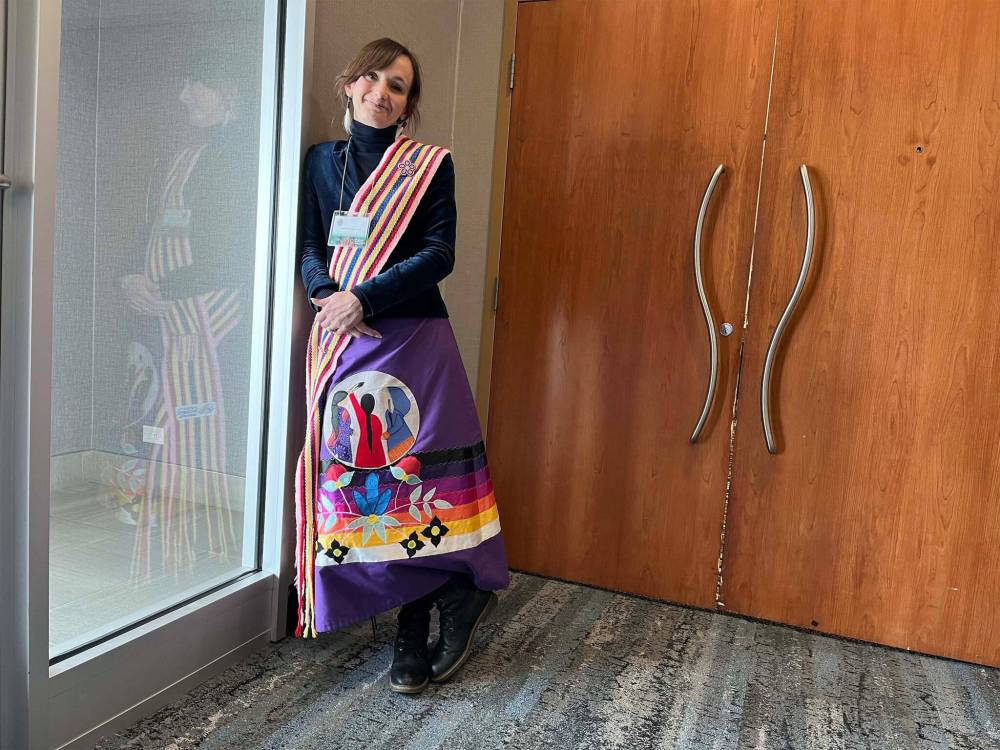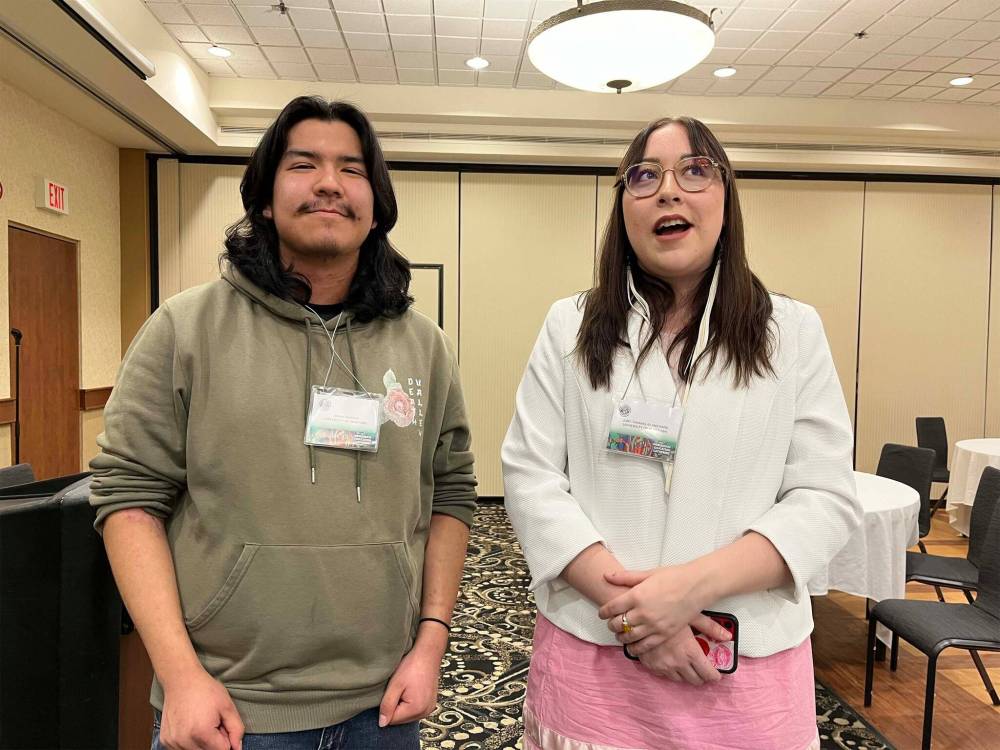Conference unites educators to safeguard Indigenous identity, combat ‘pretendians’
Advertisement
Read this article for free:
or
Already have an account? Log in here »
To continue reading, please subscribe:
Monthly Digital Subscription
$0 for the first 4 weeks*
- Enjoy unlimited reading on winnipegfreepress.com
- Read the E-Edition, our digital replica newspaper
- Access News Break, our award-winning app
- Play interactive puzzles
*No charge for 4 weeks then price increases to the regular rate of $19.00 plus GST every four weeks. Offer available to new and qualified returning subscribers only. Cancel any time.
Monthly Digital Subscription
$4.75/week*
- Enjoy unlimited reading on winnipegfreepress.com
- Read the E-Edition, our digital replica newspaper
- Access News Break, our award-winning app
- Play interactive puzzles
*Billed as $19 plus GST every four weeks. Cancel any time.
To continue reading, please subscribe:
Add Free Press access to your Brandon Sun subscription for only an additional
$1 for the first 4 weeks*
*Your next subscription payment will increase by $1.00 and you will be charged $16.99 plus GST for four weeks. After four weeks, your payment will increase to $23.99 plus GST every four weeks.
Read unlimited articles for free today:
or
Already have an account? Log in here »
Hey there, time traveller!
This article was published 06/02/2025 (288 days ago), so information in it may no longer be current.
How should Indigenous people protect their identity, define their identity, and work to prevent “pretendians?”
The nuanced question was discussed Thursday at a gathering hosted by the Manitoba Collaborative Indigenous Education Blueprint, a collective of post-secondary institutions, school boards, government bodies and Indigenous organizations working toward improving education in the province.
Attausikuuluta, which means “working all together” in Inuktitut, was a chance for the groups to collaborate and work to integrate Indigenous ways of learning into their classrooms.

MALAK ABAS / FREE PRESS
Denise Tardiff, the manager of the Manitoba Collaborative Indigenous Education Blueprint – a collective of post-secondary institutions, school boards, government bodies and Indigenous organizations working toward improving education in the province.
“In a way, it’s charting new territory, trying to walk in both worlds and navigate that,” said Denise Tardiff, the collaborative’s manager, from the convention Thursday morning.
“It’s definitely necessary, and we learn from each other.”
Part of that collaboration comes in the form of a project underway to create a policy for educational institutions to verify Indigenous identity and find people impersonating that identity for personal gain.
In recent years, investigations have led to questions about the Indigenous identity of a number of notable people, including folk singer Buffy Sainte-Marie, former judge Mary Ellen Turpel-Lafond and University of Saskatchewan professor Carrie Bourassa.
Seeing the issue increasingly front and centre in educational institutions and headlines made it clear this was a central issue the group needed to address, Tardiff said.
“Whether that’s because these things are fashionable for whatever reason, alongside that, (there) are more opportunities,” she said.
“With the victories won, there are actually more opportunities for Indigenous students, staff, professors, faculty members, all of these things, researchers … then (impersonating Indigenous heritage) has become an increasing problem. But it’s not black and white.”
Looming over the conversation, Tardiff said, are concerning shifts south of the border. An anti-diversity push by U.S. President Donald Trump in part through an executive order ending diversity, equity and inclusion contracting in the federal workforce has resulted in companies pulling their diversity commitments.

MALAK ABAS / FREE PRESS
Minister of Advanced Education and Training Renée Cable.
“I think it reminds us that rights in progress are precarious, and funding could be taken away as quickly as it’s granted,” she said.
Advanced education and training Minister Renée Cable, who is Métis, spoke at Thursday’s gathering.
She echoed Tardiff’s concerns, but noted in Canada’s push to assert its national identity in the face of new U.S. leadership, she believed Manitobans would “become even more firmly rooted” in the discussions happening at the gathering.
“I do believe it’s going to become even more important,” she said.
“We’re talking a lot about what makes us Canadian and what makes us strong as Canadians and Manitobans, and part of that is our collective identity, which is rooted in a sense of collaboration, acceptance, belonging, and absolutely an acknowledgement of the first people who were here.”
University of Manitoba students Jory Thomas-Blanchard and Jonah Harper held a panel on Indigenous identity verification and fraud Thursday.
Thomas-Blanchard, who serves as co-president of the Métis University Students Association, said the conversation is happening more and more with students she works with.
“You can almost spot it when someone’s just doing it for their own gain, and that happens, too, when they don’t know their identity and they don’t have the same hardships or experiences that we might have,” she said.

MALAK ABAS / FREE PRESS
Jonah Harper and Jory Thomas-Blanchard, University of Manitoba students who held a panel on Indigenous identity verification and fraud.
Harper, who is from St. Theresa Point, noted that gatherings like Attausikuuluta are meaningful for Indigenous people to find solidarity and joy with each other.
“You look around, you see people talking, you see people laughing, catching up,” he said. “It’s a nice thing to see.”
Attausikuuluta continues Friday at the Victoria Inn at 1808 Wellington Ave.
malak.abas@freepress.mb.ca

Malak Abas is a city reporter at the Free Press. Born and raised in Winnipeg’s North End, she led the campus paper at the University of Manitoba before joining the Free Press in 2020. Read more about Malak.
Every piece of reporting Malak produces is reviewed by an editing team before it is posted online or published in print — part of the Free Press‘s tradition, since 1872, of producing reliable independent journalism. Read more about Free Press’s history and mandate, and learn how our newsroom operates.
Our newsroom depends on a growing audience of readers to power our journalism. If you are not a paid reader, please consider becoming a subscriber.
Our newsroom depends on its audience of readers to power our journalism. Thank you for your support.




